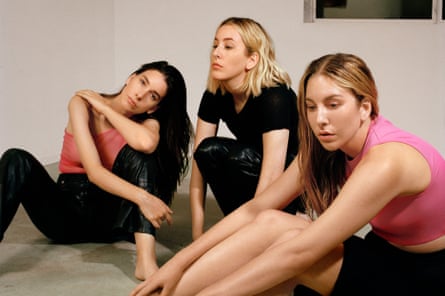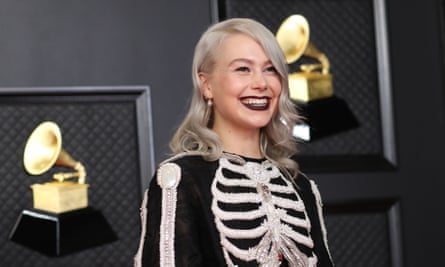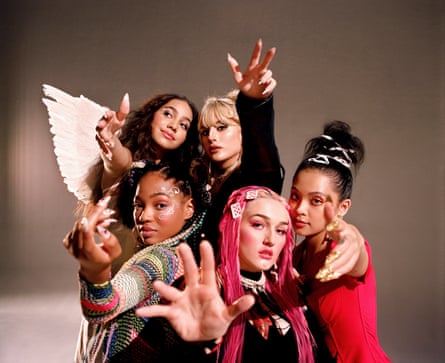
This article is more than
2 year old
The moment that we started a band was the best thing that ever happened,” sings Matty Healy on the 1975’s recent single Guys. The song is an ardent love letter to the band, and to the romance of bands in general: the camaraderie, the solidarity, the joyous fusion of creativity and friendship. It’s an old sentiment but an increasingly rare one.
“It’s funny, when the first Maroon 5 album came out [in 2002] there were still other bands,” the band’s frontman Adam Levine told Apple Music’s Zane Lowe this month. “I feel like there aren’t any bands any more … I feel like they’re a dying breed.” Levine was quick to clarify that he meant bands “in the pop limelight” but the internet doesn’t really do clarification, so his remarks sparked bemusement and outrage among the literal-minded, from aggrieved veterans such as Garbage (“What are we Adam Levine? CATS?!?!?”) to fans of newcomers such as Fontaines DC and Big Thief.
But hurt feelings aside, Levine was broadly correct. When Maroon 5 broke through in the 00s, there were new bands forming all the time, many of which quickly proceeded to go platinum and headline arenas. In the realm of pure pop, meanwhile, talent shows such as The X Factor became a reliable incubator of girl groups and boybands, from Girls Aloud to One Direction. No longer. Popular music’s centre of gravity has undeniably moved towards solo artists, at least when it comes to serious commercial success. This paradigm shift has been obvious for a while now (“What happened to all the bands?” asked Rostam Batmanglij after leaving Vampire Weekend in 2016. “Is it just that bands are corny now?”) and has accelerated across genres.

Whichever metric you use, the picture is clear. Right now, there are only nine groups in the UK Top 100 singles, and only one in the Top 40. Two are the Killers and Fleetwood Mac, with songs 17 and 44 years old respectively, while the others are the last UK pop group standing (Little Mix), two four-man bands (Glass Animals, Kings of Leon), two dance groups (Rudimental, Clean Bandit) and two rap units (D-Block Europe, Bad Boy Chiller Crew). There are duos and trios, but made up of solo artists guesting with each other. In Spotify’s Top 50 most-played songs globally right now, there are only three groups (BTS, the Neighbourhood, and the Internet Money rap collective), and only six of the 42 artists on the latest Radio 1 playlist are bands: Wolf Alice, Haim, Royal Blood, Architects, London Grammar and the Snuts.
Of course, radio and streaming are dominated by pop, rap and dance music but festival lineups don’t point to a golden age of bands, either. Of those that have emerged in the past decade, only half a dozen have headlined either Coachella, Reading/Leeds, Latitude, Download, Wireless or the main two stages at Glastonbury. That’s the 1975, Haim, alt-J, Rudimental, Bastille and Tame Impala, and the last of those is effectively a solo project. Only one band, the Lathums, appeared on the BBC’s annual tastemaking Sound of … longlist this year, which is not unusual: bands haven’t been in the majority since 2013. The album charts are still regularly topped by bands thanks to loyal fanbases who still buy physical formats – such as Mogwai, Architects and Kings of Leon in recent weeks – but not since 2016 has one hung on for a second week. So what happened?
Art-pop band Maxïmo Park broke through in 2005, during the huge post-Strokes boom in rock bands. In the era of sales-based charts and Top of the Pops, they had eight Top 40 hits. “Bands were alongside pop acts on the radio and on TV,” says frontman Paul Smith. “We did Top of the Pops with Amerie and the Scissor Sisters. I think it was healthy. It could be anything next: R&B, alternative rock, whatever. Music has been compartmentalised a lot more.”

Rock and pop now exist in different spheres – even the biggest bands struggle to crack the streaming-driven Top 20 – but bands are on the back foot within alternative music itself. One theory is that major labels avoid bands because solo artists are cheaper and easier to handle. Not so, says Jamie Oborne, whose Dirty Hit label has found success with bands (the 1975, Wolf Alice) and solo artists (Beabadoobee, Rina Sawayama). “We’re actively trying to sign bands,” he says. “I’m desperate to find a really young band that I can help develop.”
The problem is, he says, there aren’t that many around. “It’s more likely now that a kid will make music in isolation because of technology. When I first met the 1975, they were all friends meeting in a room to make noise. So much is done in bedrooms these days, so you’re more likely to be by yourself.”
Ben Mortimer, co-president of Polydor Records, says that cost is more of an issue for artists than for labels. “If you’re young and inspired to become a musician, you face a choice. If you go the band route, you need to find bandmates with a similar vision, you need expensive instruments and equipment, and you need to get out on the road to hone your craft. On the other hand, you could download Ableton [production software], shut your bedroom door and get creating straight away. Culture is shaped by technology.”
Starting a band is expensive – it would be a disaster if it’s only open to middle-class kidsJoff Oddie, Wolf Alice
“Starting a band is hugely expensive,” says Joff Oddie, guitarist with Wolf Alice. “You need an immense amount of equipment and a lot of space. I spent most of my student loan on rehearsal space. Travelling is expensive. Anything that can be done to make being in a band tenable for young artists is good, because the fear is that we’ll lose that tradition. I think it would be a disaster if it’s only open to middle-class kids.”
Mortimer, who started out in A&R in 2001 and has signed bands including Haim and Years & Years, says that Polydor are still launching young bands, including Dublin’s Inhaler, while sister label Island has Easy Life and Sports Team, but there are fewer contenders than there were a decade ago. “The majority of young people aren’t excited by band music in the traditional sense: groups of lads with guitars. And that’s reflected in the number of streams these bands receive. That then impacts on what talented young musicians go on to create. If they’ve grown up obsessing over rap music with their friends, they’re more likely to start creating rap music.”
The ability to create laptop symphonies has also changed the shape of those bands that have thrived. Dominated by singer-writer-producers, the likes of Bastille and Polydor’s Glass Animals (who recently ousted Olivia Rodrigo from the top of the Australian charts) make production-led pop, which means those frontmen are virtually solo artists in the public eye. Excepting Little Mix – who have seen one member leave and another sign a solo management deal this year – Haim might be the only young band around with more than one widely recognised member.
Establishing multiple personalities in the public’s imagination has always been trickier than selling one person, but MTV and a vibrant music press helped, while TV talent shows introduced group members to millions of viewers across several weeks before they had released a note of music. All three of those institutions have waned, leaving bands to make their own way in the online attention economy. “Social media has filled the hole, creating individual stars who are seen as more ‘authentic’ than anything the retro talent-show format could offer,” says Hannah Rose Ewens, author of Fangirls, a study of contemporary fandom.

Social media is built for individual self-expression. Platforms such as TikTok, Instagram and Twitter – and even the portrait orientation of a smartphone screen – give an advantage to single voices and faces while making group celebrity less legible. Even within indie-rock, the most band-friendly genre apart from metal, the cult of the individual is stronger than ever, which has the advantage of enabling more women to rise to the fore. “Phoebe Bridgers, Soccer Mommy, Waxahatchee and other solo rock acts are essentially leading the genre now,” says Ewens. “Phoebe Bridgers, who is extremely online and very savvy about using Instagram and Twitter in a way that Gen Z finds relatable and funny, has attracted pop levels of idolatry.”
Perhaps, too, there is less of an appetite for the interpersonal drama of a group. In the time before reality shows, bands offered insights into group dynamics (if we’re being highfalutin) or voyeuristic entertainment (if we’re not). Even now, new generations of fans enjoy finding out exactly what Paul or John said in 1969, or which messy divorce inspired which Fleetwood Mac song, or how Noel and Liam came to hate each other’s guts. On one level, every band is a psychological experiment in which disparate personalities are crammed into close proximity and thrust into the spotlight. You don’t need bands for that experience now that it is the cornerstone format of reality television. The great tea-spilling, click-attracting feuds in modern pop are between solo artists, not within bands.
In Asia, though, it’s an entirely different story. “Idol” groups, painstakingly assembled, trained, styled and choreographed for maximum appeal, have been at the forefront of Japanese and Korean pop for decades. K-Pop stars BTS are the world’s biggest pop group. “Strategically, this system has more to offer to the fans than a solo artist,” says Shin Cho, head of K-Pop and J-Pop at Warner Music Asia. “Individual fans have their own favourite members but also appreciate the chemistry in a group. There can also be sub-group projects that offer something different. The group format is viewed as more dynamic because there is simply more to do and show compared to a solo artist.”

Sonny Takhar, former global president of Simon Cowell’s Syco Music, who worked with One Direction, Little Mix and Fifth Harmony, hopes that this is still possible in the UK and US, too, albeit in a less regimented way. Now CEO and founder of KYN Entertainment, he recently launched a new five-woman group, Boys World, who have racked up more than 30m likes on TikTok. “It’s always been much more expensive than launching a solo artist,” he says. “However, you need to exercise more patience in today’s market. Gen Z has many choices and demands on their time compared with those of a teenager five years ago. There’s a constant fight to gain their attention. Pop groups need to be very relatable. Every fan should recognise an element of themselves in the girls’ personalities and lives.”
Takhar assembled Boys World through a more organic process than the old Syco model, giving existing members a role in recruiting new ones. “The girls were very much at the centre of each decision to ensure that they formed a gang of friends first and foremost. They have grown up on social media and are very comfortable using it on their own terms. It’s far better than a formatted TV show. They are in control. The age of the svengali is over.”
Look at Fontaines DC. I see a picture of them and wish I was in a band. Like feeling like you’re part of somethingJamie Oborne
The challenge posed by all pop cultural trends is to work out whether or not it is a permanent structural shift or just another phase. The right group at the right time, whether it is the Strokes or the Spice Girls, can change everything. In the short term, the pandemic has made it impossible for new bands to form and threatens the survival of the regional venue circuit on which they depend, while Brexit has thrown up expensive new obstacles for touring bands. Yet Oborne remains optimistic.
“I’m excited about the wave of creativity that’s going to follow this period that we’ve just lived through,” he says. “I feel this hankering in youth culture for real experience and connection. I’m still quite the romantic when it comes to music. Look at Fontaines DC. I see a picture of them and wish I was in a band. It’s the same thing as walking down the street with your friends and feeling like you’re part of something. Anything’s possible.”

Regardless of trends in music technology, streaming and celebrity culture, there is still a lot to be said for being able to share the pleasures and pressures of life in the music industry with a group of peers. Having released four solo albums as well as seven with Maxïmo Park, Paul Smith is well-placed to compare the two scenarios.
“I can get things done a lot quicker as a solo artist,” he says. “I can choose the artwork, decide the tracklisting: little things that take us weeks because we have an egalitarian mindset. You can make a bit more money. But I love the communal aspect of being in a band. You’re sharing everything: sharing the profits but also sharing the load. If you’re a big solo star and you’re not enjoying it, it must be one of the loneliest places you can be.”
“We’re fanatical about bands and being in a band,” says Wolf Alice’s Joff Oddie. “A good band creates a community. They have an ecosystem that, as a fan, you feel like you want to be part of. Despite all that’s been said about individualism, there is still a hunger for that collective feeling.” Perhaps you just have to squeeze it all into a phone screen.
This article was updated on 19 March with a correction: Easy Life and Sports Team are signed to Island Records, not Polydor.